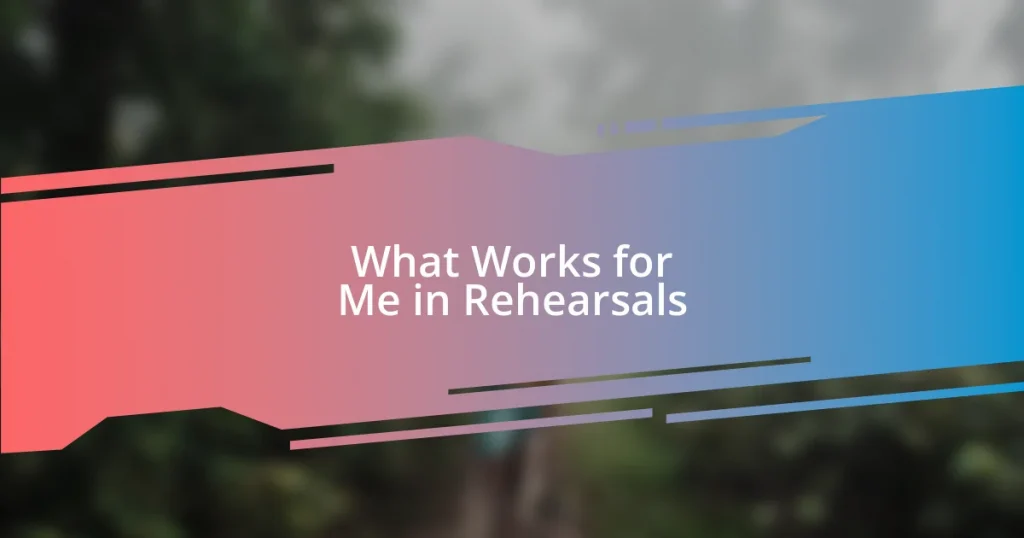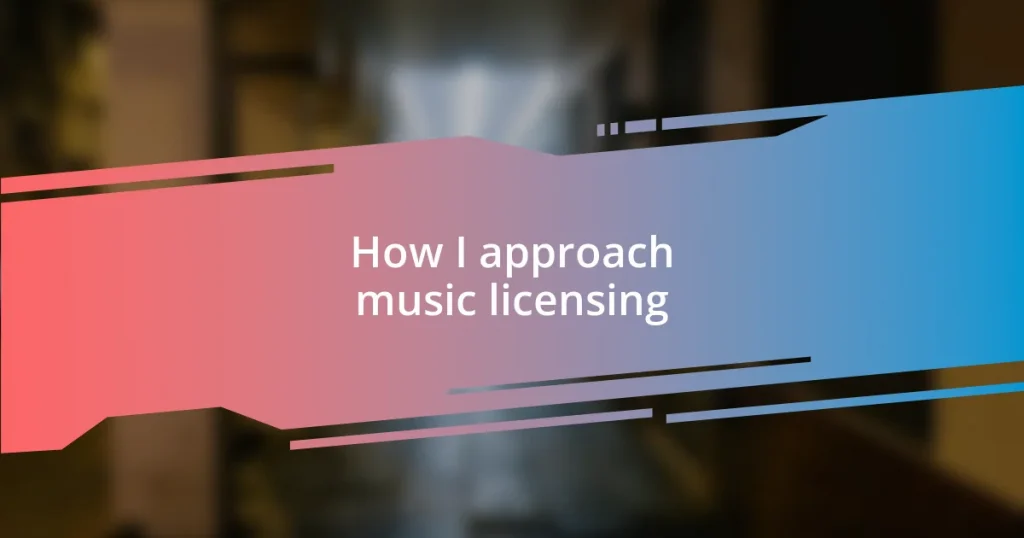Key takeaways:
- Setting specific, actionable rehearsal goals enhances focus and improves performance outcomes through targeted efforts and shared objectives.
- Creating a positive atmosphere fosters collaboration and creativity among the team, making rehearsals more engaging and effective.
- Incorporating feedback constructively and reflecting on performance outcomes facilitates growth, strengthens team dynamics, and elevates individual performances.
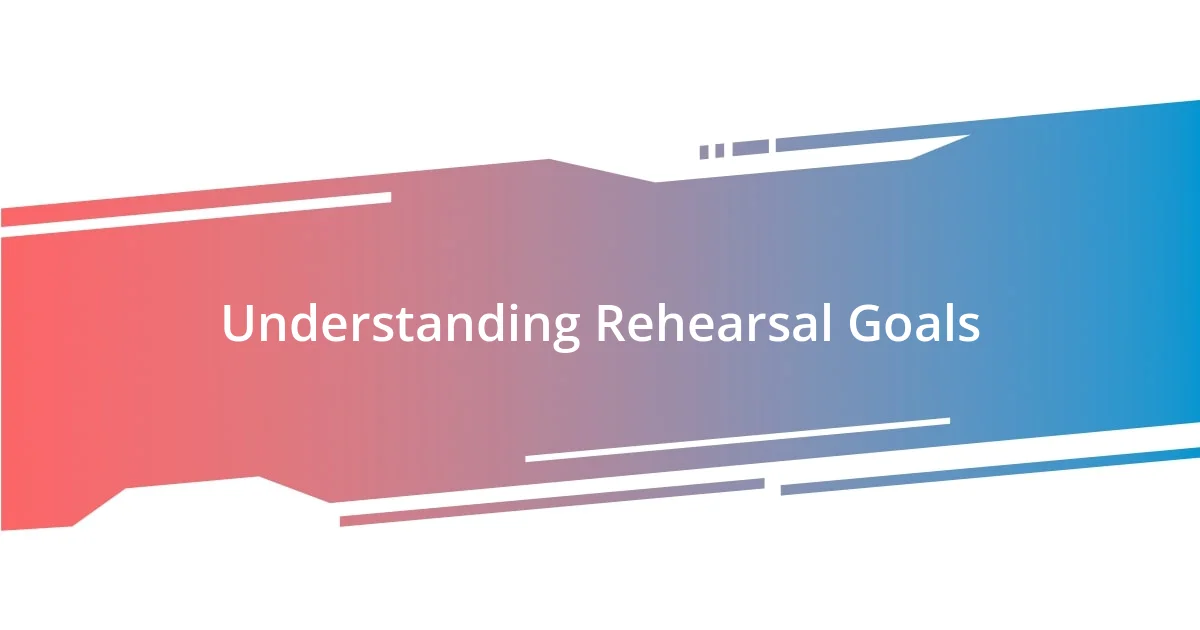
Understanding Rehearsal Goals
Understanding rehearsal goals is crucial for maximizing the effectiveness of our practice time. I’ve often found myself in rehearsals where the focus was unclear, which made it challenging to feel productive. Reflecting on this, I wonder: How can we truly measure our progress if we don’t know what we’re aiming for?
For me, setting specific, actionable goals transforms a vague rehearsal into a focused one. There was a time when I struggled to hit the right emotional notes in a scene, and when I shifted my mindset to focus on mastering that aspect, everything changed. Have you ever noticed how concentrated efforts can lead to breakthrough moments?
I also believe that establishing both individual and group goals fosters collaboration and teamwork. I once led a group where we collectively decided on the intention behind each scene, and it was amazing to witness how that clarity brought everyone together. It makes me think: When everyone shares a common objective, how much more powerful can our performances become?
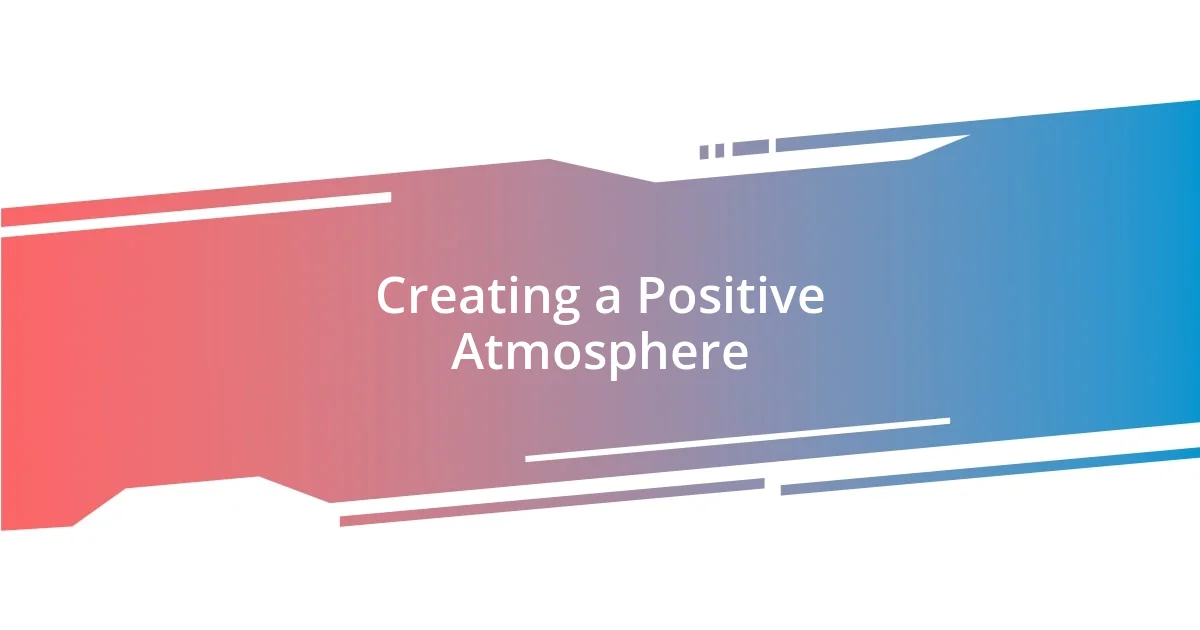
Creating a Positive Atmosphere
Creating a positive atmosphere in rehearsals makes a significant difference in how we connect with one another. I remember one afternoon when our energy felt flat—nobody wanted to dive into the material. To shift the mood, I suggested we start with a simple game. The laughter and relaxed vibes that followed not only brightened the room but also opened up everyone for collaboration. It’s fascinating how a little playfulness can transform our approach and enhance creativity.
- Encourage open dialogue: Invite everyone to share their thoughts and feelings.
- Celebrate small wins: Acknowledge progress, no matter how minor it may seem.
- Use humor: Light jokes can break the ice and help relieve tension.
- Start with something fun: Icebreakers can set a positive tone for the session.
- Create a space for vulnerability: Allowing room for mistakes fosters trust and connection.
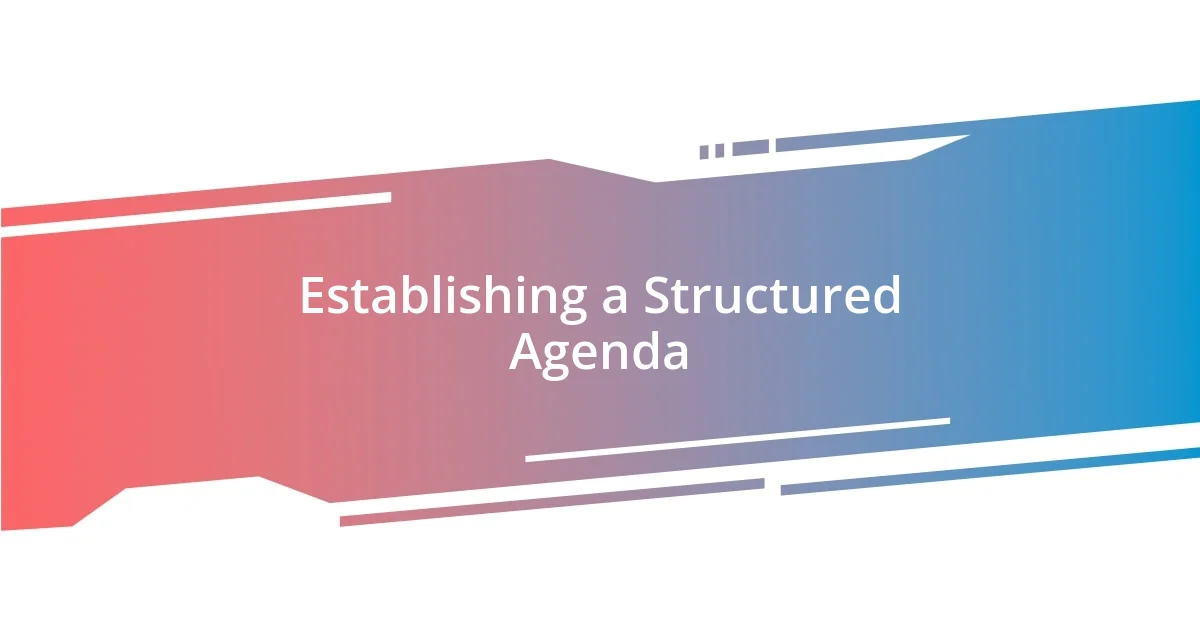
Establishing a Structured Agenda
Establishing a structured agenda has been a game-changer in my rehearsal experience. I recall one particularly chaotic session where, without clear direction, we bounced between topics without making any real progress. By incorporating a defined agenda, I observed how quickly we could identify our priorities and stick to them. This focus not only kept us on track but also allowed us to dig deeper into our material.
In practice, I’ve found that splitting our rehearsals into distinct segments can really enhance our efficiency. For example, we would dedicate specific time slots for warm-ups, scene work, and feedback. Having these timeframes has helped everyone understand what to expect and cultivate a sense of accountability. I still remember the day we implemented this structure—everyone left feeling energized because we tackled more than we thought possible. Don’t you think it’s freeing to know exactly what the plan is?
Creating that structured agenda also facilitates better communication among the team. I’ve experienced moments when feedback sessions felt rushed, leading to misunderstandings. By allowing ample time for each section, I found teammates felt comfortable voicing their opinions. This structured approach helped everyone to contribute meaningfully, making the rehearsal process collaborative. The sense of shared purpose we developed truly elevated the quality of our work.
| Feature | Benefits |
|---|---|
| Clear Time Allocation | Keeps the rehearsal focused and promotes efficiency. |
| Segmented Sessions | Encourages deeper exploration of material within scheduled timeframes. |
| Enhanced Communication | Promotes a supportive environment where everyone can share thoughts. |
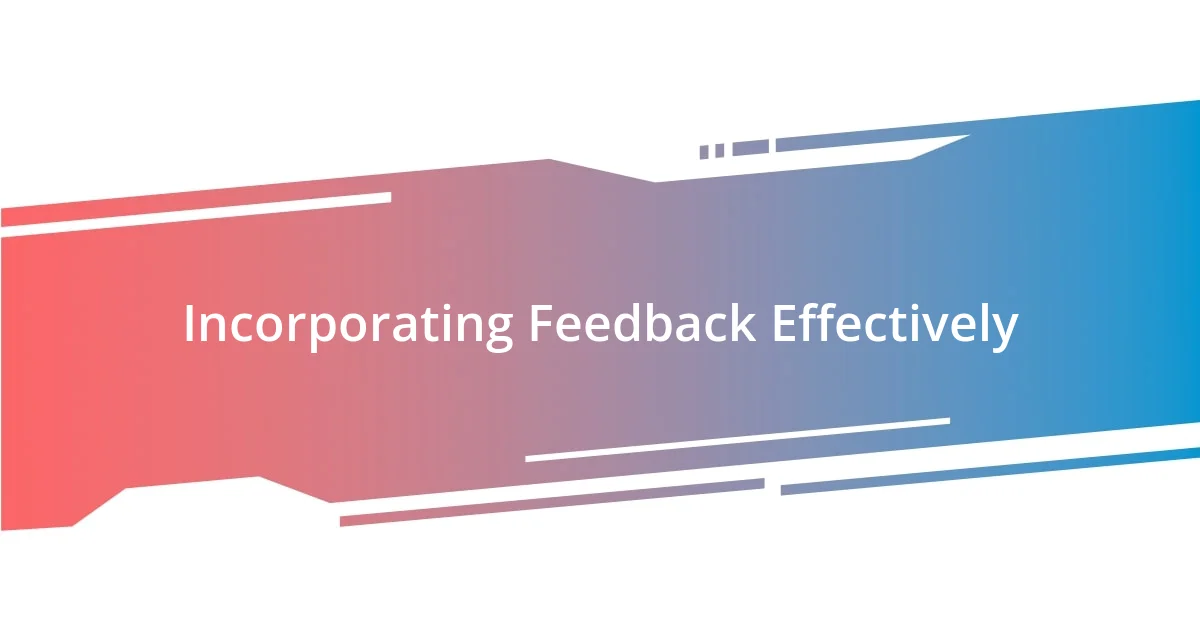
Incorporating Feedback Effectively
Incorporating feedback effectively is where the real magic happens in rehearsal. I once had a teammate who struggled to receive critiques, often shutting down whenever we provided input. To help her, I initiated an anonymous feedback system, which allowed everyone to express their thoughts without the pressure of direct confrontation. Seeing her face light up when she read supportive comments made me realize how understanding the delivery is just as important as the feedback itself.
It’s crucial to create a constructive environment for feedback. I remember a session when I shared my interpretation of a scene, and rather than feeling defensive, I chose to approach the critiques with curiosity. I asked, “What do you think could elevate this performance?” The responses were enlightening; not only did they challenge my perspective, but they also added layers to the character I hadn’t considered before. Isn’t it remarkable how a shift in mindset can transform criticism into a tool for growth?
When implementing feedback, I find it helpful to follow up on the discussed points in subsequent rehearsals. Once, after addressing some vocal issues identified during a feedback session, I made a conscious effort to apply the suggestions. The next time we gathered, I eagerly asked my peers if they noticed any improvements. The collective feeling of growth, especially when they recognized my progress, created an exhilarating sense of camaraderie. It underscored my belief that feedback isn’t just about making improvements; it’s about building stronger, more connected performances together.
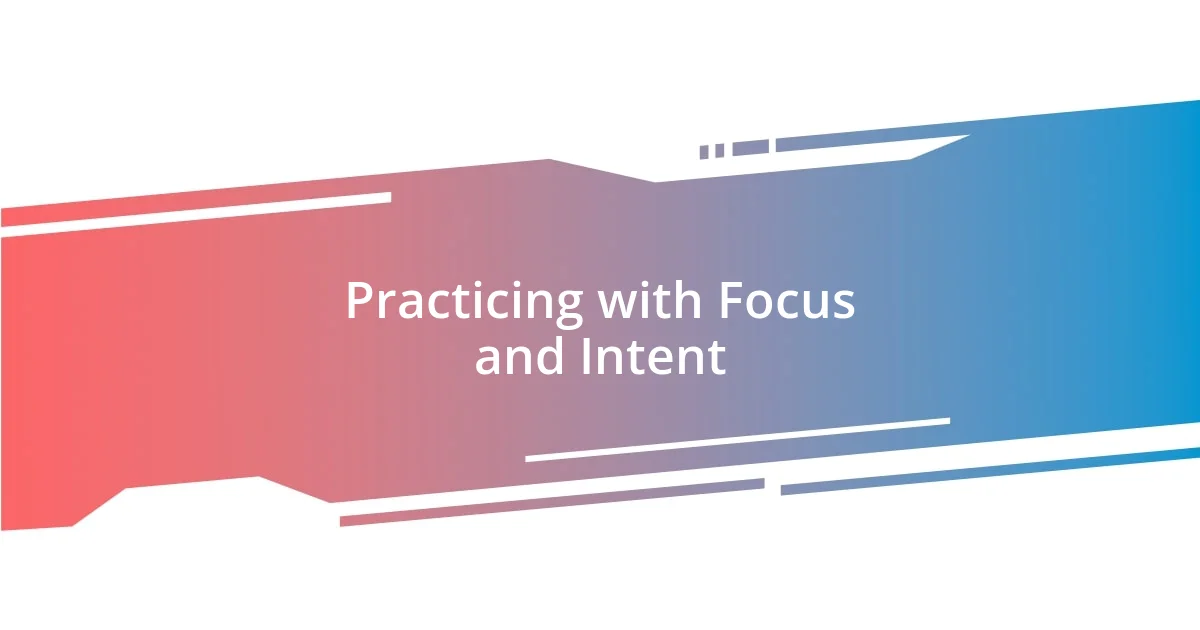
Practicing with Focus and Intent
Maintaining focus and intent during rehearsal is like tuning a musical instrument; it requires constant attention and adjustment. I remember one evening, determined to polish a scene, I asked everyone to only focus on the emotional beats we were trying to convey. It was fascinating to see how that singular focus transformed the energy in the room. Hasn’t it ever struck you how a sharp concentration can foster a kind of synergy among the cast? That night, we really connected, and the scene blossomed into something far more powerful than I had anticipated.
Sometimes, I stumble back into distractions—those random thoughts about dinner or tomorrow’s meeting. So, I developed a habit of setting a “focus intention” at the start of each rehearsal. For instance, even just declaring, “Let’s explore the vulnerability in our characters today” serves as a hiking stick to keep me on the right path. I can’t stress enough how effective that has been; it creates a clear mental marker for what we’re striving to achieve and helps everyone stay engaged. Do you think there’s magic in focusing collectively on a shared intention?
Ultimately, practicing with intent goes beyond just the physical actions; it also includes mental engagement. There was a rehearsal where I felt overwhelmed by all the notes we had to incorporate. Instead of seeing it as a burden, I reframed it as an opportunity to grow. I remember sitting down afterward, breathing deeply, and visualizing how all these elements could harmonize. That shift helped clarify my mind and allowed me to return the next day with a refreshed perspective. Embracing that process of intention-infused practice truly enhances not just individual performances, but the entire team dynamic.
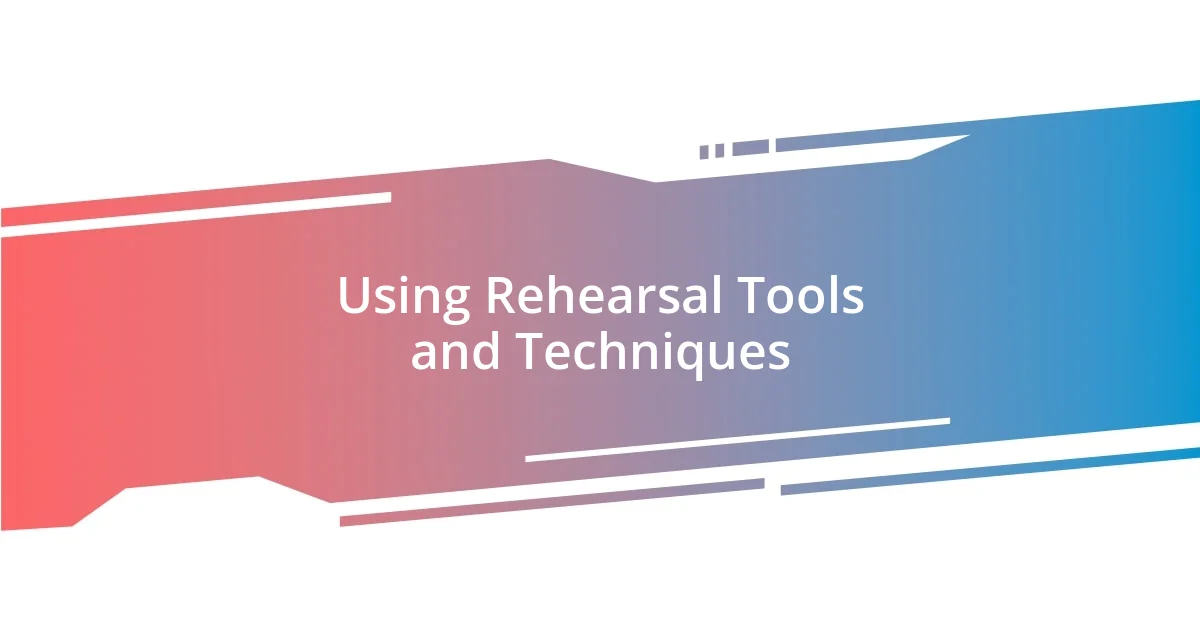
Using Rehearsal Tools and Techniques
Using rehearsal tools and techniques can truly elevate the entire process. One time, I utilized a recording device during a rehearsal to capture our performances. Listening back, I was amazed at how it highlighted not just our strengths but also the areas where we could improve. Have you ever noticed how hearing your own performance can feel different from experiencing it live? It opened my eyes to nuances I didn’t even realize were there, transforming my approach to the next round of rehearsals.
Alongside recordings, I find that visual aids can be game-changers. For instance, I created simple cue cards with emotional triggers for my character in a show. During one trickier scene, I held the card, and it sparked an instant emotional response that grounded me in the moment. It’s incredible to think how a little piece of paper can help you tap into deeper layers of character. Isn’t it fascinating how something so basic can lead to such profound discoveries?
In addition to these tools, embracing improvisation techniques can inject freshness into rehearsals. I remember a day when we set aside our scripts entirely and allowed ourselves to explore the scene without predetermined dialogue. The spontaneity that unfolded led to an explosive exchange of ideas, and we uncovered dynamics that enriched our performance. Have you ever experimented with letting go of structure? That freedom can be exhilarating and often unveils the unexpected magic hidden beneath the surface.
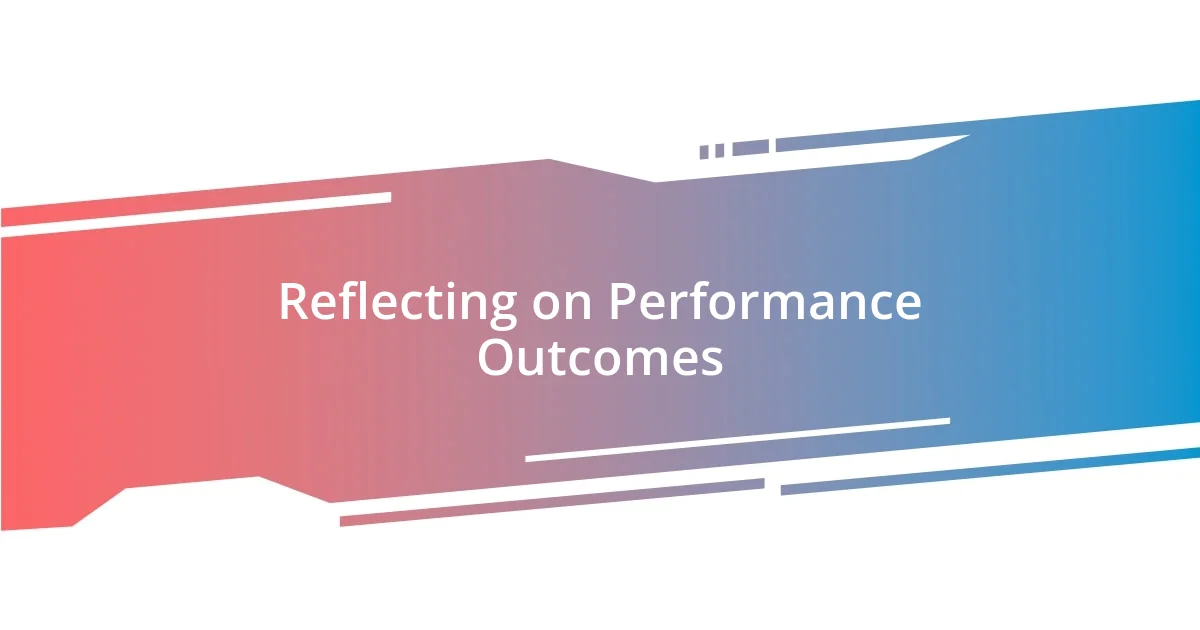
Reflecting on Performance Outcomes
Reflecting on performance outcomes is crucial for growth. After a show, I often take a moment to think about what went well and what didn’t. I recall one performance where I felt the audience’s energy shift after a particular line. Did it resonate with them, or was it just me? That feeling propelled me to analyze the impact of that moment, leading to valuable adjustments for future shows.
I remember a time when the entire cast gathered to discuss our last performance. Each of us shared our experiences, and I brought up a scene that felt flat to me. To my surprise, several cast members expressed how they connected with it in ways I hadn’t noticed. This shared reflection was enlightening—it transformed my view from self-critique to collective growth. Have you ever experienced a moment where feedback opened your eyes to a different perspective?
Taking the time to reflect helps weave a narrative of progress. I’ve found that journaling about my performances reinforces my learning. After a particularly intense show, I wrote down my feelings, capturing everything from triumph to disappointment. This practice empowers me to celebrate the successes and confront the challenges candidly. How has journaling or reflecting on past experiences shaped your journey? I believe these insights foster resilience and a deeper connection to the craft.










